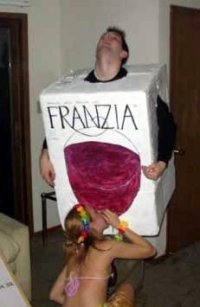As winemakers come under greater pressure to ensure they are offsetting the environmental impacts of their operations, one global vintner believes that the humble carton may offer a productive new solution.
Jean-Charles Boisset, president of the Boisset family estate, said that its use of an octagonal multi layer carton for its French Rabbit brand of varietal wines had allowed the group to reduce material use by 90 per cent compared to glass-based wines.
Although only five per cent of the company's wine output, which totals about 5m cases of wine annually, comes from glass-alternative packaging, Boisset said that he believes operational improvements can be achieved from innovation in this area for more immediate consumption wines.
Wine companies are facing a challenge in finding new ways to package and distribute their products as part of wider calls for the entire beverage industry to ensure sustainability in production and sourcing.
The Prisma pack
Speaking over video link at an environmental conference being hosted by Tetra Pak, which supplies the eight-sided Prisma packaging for the wine, Boisset said that the wine industry has been "complacent" in adapting to packaging innovations and needed to change.
The carton, which combines polyethylene and aluminium to protect the wine from the impacts of UV rays, has a twist off plastic cap, making the product fully recyclable.
Besides the potential improvements of the Prisma pack regarding material use, the company claims there are convenience benefits as well related to using such packaging.
Boisset claimed that in opting for an octagonal product over the more traditional brick shape, the group have found a packaging that is still eye catching, while allowing for easier fridge storage and shatter proof alternative to glass during the product distribution.
Glass alternative push
While not a solution for ageing wine, with the aluminium-lined Prisma packaging offering a maximum storage life of about 24 months, Boisset said that he hoped to be part of a revolution in the wine industry to encourage acceptance of new types of wine packaging.
"We are not keeping innovations such as the French rabbit packaging to ourselves," he stated. "By helping to encourage greater competition in the carton and alternative wine-packaging sector, we hope to actually create an entirely new segment in the industry."
Boisset suggested that the main challenge would be consumer and retailer attitudes to the notion of drinking a carton of wine, though with French Rabbit on sale across Canada as well as the Stade de France in Paris, the message may be catching on.
With the product available in a number of countries worldwide, he added that demand in different markets for innovative new wine packaging was being driven by a variety of requirements.
These range from greater convenience in storing and transporting a product, to improved carbon footprint levels and other green factors.
However, the Boisset family remain far from the only wine group hoping to expand into new areas for pack innovation.
Industry-wide focus
Back in March, major players in the UK wine industry said they would team up with packagers and other stakeholders to improve cooperation in supplying lightweight glass bottles to tackle environmental concerns over the product.
The pledge was made at the closing of a forum between winemakers, retailers and their supply chain partners, which aimed to discuss ways of increasing the availability of lighter weight glass bottles.
Glass support
The decision followed the publication of findings by the Waste and Resources Action Programme (WRAP),which suggest that manufacturing glass emitted less carbon dioxide than manufacturing PET (polyethylene terephthalate) on a per unit weight basis.
A number of groups including WRAP, as well as producers and packagers like Constellation Europe, Kingsland Wine & Spirits, and Ardagh Glass UK, attended the forum.
The participants agreed to improve communication and cooperation in the supply chain from bottle makers up to retailers on how to better obtain light weight glass for packaging.
However, John Corbet-Milward, a technical director for industry body the Wine and Spirits Trade Association (WSTA) said there was a lot of work to be done in order to meet its green ambitions.
"This is a challenge facing the whole industry because it's clear the UK wine sector needs to reduce the thousands of tonnes of packaging waste it produces every year," he stated. "We are pleased to have brought industry players face to face and delighted they have agreed to work more closely in future on the issue of lighter weight bottles."
Wrap findings
According to the WRAP study, manufacturing glass is less carbon intensive than manufacturing PET on a per unit weight basis.
However, a PET wine bottle can be manufactured of lower weight than the glass equivalent and light weighting has been shown to reduce CO2 emissions with regard to transportation of loads.
Neil Merrett
Lund, Sweden
skip to main |
skip to sidebar
Enhance the pleasure that you get from wine by sharing your experiences, knowledge, news articles and facts about the elixir of the gods and bacchanalia on earth by emailing: bacchusforyou@bellsouth.net
How Much Did The Best Bottle of Wine You Ever Drank Cost?
CONTACT INFORMATION
TO SUBMIT A POST, TO BE PUT ON THE MAILING LIST, TO HAVE QUESTIONS ANSWERED, ETC.
EMAIL:



